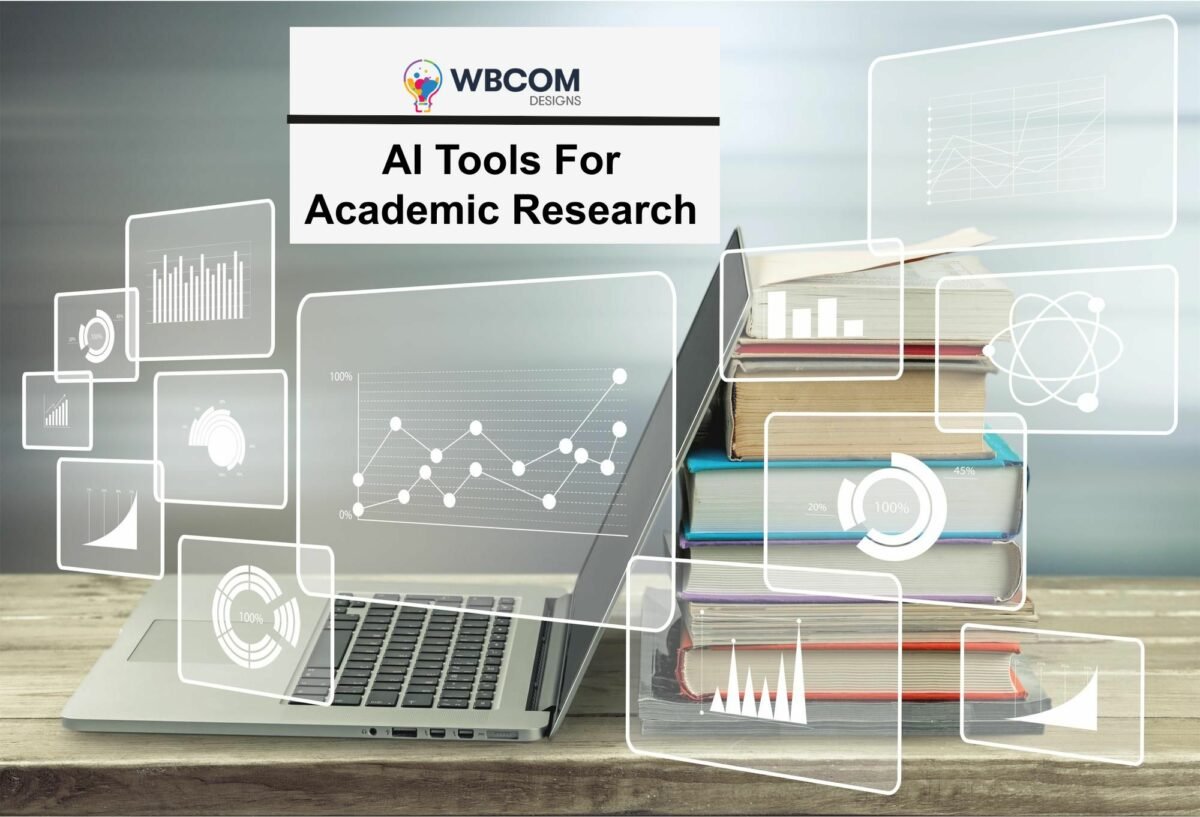In the realm of academic research, the advent of artificial intelligence (AI) has brought about significant advancements and transformations. AI tools for academic research have revolutionized the way researchers collect, analyze, and interpret data, making the research process more efficient, accurate, and insightful. These tools leverage machine learning algorithms, natural language processing, and data mining techniques to assist researchers in various aspects of their work, with literature review software, data analysis, citation management, and knowledge discovery. In this blog, we will explore some of the top AI tools specifically designed for academic research, highlighting their key features, benefits, and how they contribute to enhancing research productivity and outcomes.Whether you are a student, professor, or academic professional, incorporating AI tools into your research toolkit can empower you to delve deeper into your subject matter and unlock new possibilities in your academic endeavors.
Table of Contents
ToggleOverview Of The Top AI Tools Of 2024
1. Google Scholar
Google Scholar is a widely used AI tool for academic research that allows users to search and access scholarly literature across various disciplines. It provides access to a vast collection of academic papers, articles, conference proceedings, theses, and other scholarly publications. Users can search for specific topics, discover relevant research, and access full-text articles for their academic studies. Google Scholar also offers features such as citation tracking, author profiles, and advanced search options to enhance the research process. It is a valuable resource for researchers, scholars, and students looking to explore academic literature.
Also Read: Generative AI Tools For Better Productivity (workspace)
2. Mendeley
Mendeley is an AI tool for academic research that helps researchers organize, manage, and collaborate on their research papers and references. It offers features such as reference management, PDF annotation, citation formatting, and document sharing. Users can create personal libraries to store and organize their research papers, and Mendeley’s AI algorithms can automatically extract metadata from uploaded documents, making it easier to organize and search for papers. Additionally, Mendeley provides a platform for researchers to connect and collaborate with peers, share research papers, and discover new publications in their field. It is a popular tool among researchers for its robust features and community-driven approach to academic research.
3. IBM Watson Discovery
IBM Watson Discovery is an AI-powered tool for academic research that enables users to extract valuable insights from large amounts of unstructured data. It leverages natural language processing and machine learning algorithms to analyze and understand textual data, including research papers, articles, patents, and other academic sources. With Watson’s Discovery, researchers can quickly search and explore vast repositories of information, uncover relevant patterns and trends, and gain deeper insights into their research topics. The tool also offers advanced capabilities such as entity extraction, sentiment analysis, and concept clustering, which further enhance the research process. IBM Watson Discovery provides a powerful and scalable solution for academic researchers looking to leverage AI to extract meaningful insights from diverse sources of information.
4. Zotero
Zotero is a widely used AI tool for academic research that helps researchers collect, organize, and cite their sources. It is a free, open-source reference management software that allows users to easily save and organize research materials such as articles, books, web pages, and more. With Zotero, researchers can create personalized libraries, annotate documents, and generate citations in various citation styles. It also provides a browser extension that enables users to save references with a single click while browsing the web. Additionally, Zotero allows for collaboration and sharing of research materials with colleagues. It is a user-friendly interface and comprehensive features make it a valuable tool for organizing and managing academic research projects.
5. Microsoft Academic
Microsoft Academic is an AI-powered tool designed for academic research and discovery. It provides a comprehensive database of scholarly publications, including articles, conference papers, and patents. With its advanced search capabilities, researchers can easily find relevant and up-to-date academic resources in various disciplines. Microsoft Academic also offers features like citation analysis, allowing users to explore the citation impact of specific publications and authors. The tool leverages machine learning algorithms to identify and analyze academic trends, helping researchers stay informed about the latest developments in their fields. With its intuitive interface and powerful search capabilities, Microsoft Academic is a valuable resource for academics and researchers.
6. EndNote
EndNote is a popular AI tool for academic research that helps researchers organize and manage references and citations. It allows users to create a personalized library of sources and automatically generates citations and bibliographies in different citation styles. EndNote also offers features like PDF annotation, note-taking, and collaboration tools, making it easier for researchers to keep track of their sources and collaborate with colleagues. With its integration with various databases and online resources, EndNote streamlines the research process and saves time for researchers. It is a reliable tool for organizing and citing academic references effectively.
7. SciNote
SciNote is an AI tool specifically designed for scientific research and laboratory management. It provides researchers with a digital platform to plan, organize, and track their experiments, protocols, and data. With SciNote, researchers can create and manage electronic lab notebooks, collaborate with team members, and store and analyze data securely. The tool also offers features like task management, inventory tracking, and integration with other scientific tools and instruments. SciNote helps streamline the research workflow, improve data management, and enhance collaboration among researchers, making it an essential tool for academic research in scientific fields.
8. RefWorks
RefWorks is a web-based reference management tool that helps researchers organize and manage their bibliographic data and citations. With RefWorks, researchers can easily import references from various databases, create bibliographies in different citation styles, and collaborate with other researchers by sharing references and documents. The tool offers features such as automatic citation formatting, PDF annotation, and integration with popular word-processing software. RefWorks simplifies the process of collecting and managing references, saving researchers time and effort in their academic research.
Also Read: Engage Your Community with these top-secret techniques
9. Papers
Papers is a reference management tool designed specifically for researchers and academics. It offers features for organizing, searching, and citing research papers. With Papers, users can import PDFs and metadata from various sources, create searchable libraries, and annotate and highlight important sections of papers. The tool also provides advanced search capabilities, allowing researchers to find relevant articles quickly. Papers support multiple citation styles and integrate with popular word-processing software for seamless citation insertion. Additionally, Papers offers a mobile app for easy access to research papers on the go.
10. Semantic Scholar
Semantic Scholar is an AI-powered research tool that aims to facilitate scientific discovery and knowledge exploration. It leverages machine learning and natural language processing techniques to analyze and understand scholarly papers. Semantic Scholar provides advanced search capabilities, allowing users to find relevant research articles based on specific criteria such as authors, journals, keywords, and citations. The tool also offers features like personalized recommendations, citation analysis, and access to related papers. Semantic Scholar’s AI algorithms extract key information from articles, making it easier for researchers to discover new insights and connections in their respective fields of study.
Also Read: WordPress Plugins That Help In Doubling Your Website Traffic
Experience the Benefits of AI Tools for Academic Research
In the rapidly evolving field of academic research, AI tools are revolutionizing the way scholars and researchers conduct their work. These powerful tools leverage artificial intelligence algorithms to streamline various aspects of the research process, providing numerous benefits and enhancing productivity. By embracing AI tools for academic research, researchers can experience the following advantages:
- Efficient Literature Review: AI tools can assist in a comprehensive literature review by automating the process of finding, sorting, and categorizing relevant scholarly articles. This saves significant time and effort in identifying key publications and extracting essential information.
- Advanced-Data Analysis: AI-powered data analysis tools enable researchers to process and analyze large datasets quickly and accurately. These tools can uncover patterns, correlations, and insights that may not be easily detectable through manual analysis, enhancing the quality and depth of research outcomes.
- Enhanced Data Organization: AI tools offer advanced data management and organization capabilities, allowing researchers to structure and categorize their data more effectively. This simplifies the retrieval and tracking of research data, ensuring efficient and systematic organization.
- Intelligent Citation Management: AI tools automate the process of citation management, including generating citations in various citation styles and formats. This ensures accuracy and consistency in referencing, saving researchers valuable time and effort.
- Improved Writing Assistance: AI writing tools provide valuable assistance in writing scholarly papers and manuscripts. These tools can suggest improvements in grammar, style, and clarity, aiding researchers in producing well-written and polished academic work.
- Accelerated Research Discovery: AI-driven search and recommendation systems enable researchers to discover new sources, relevant articles, and related research in their field of study. This accelerates the research discovery process, helping researchers stay up-to-date with the latest developments and expanding their knowledge base.
- Collaborative Research: AI tools facilitate collaboration among researchers by providing platforms for real-time collaboration, document sharing, and version control. This enables seamless teamwork, efficient communication, and effective collaboration on research projects.
By harnessing the power of AI tools for academic research, researchers can unlock new opportunities, increase research efficiency, and produce high-quality outputs. These tools empower researchers to delve deeper into their fields, make significant contributions, and stay at the forefront of academic advancements.
Conclusion
AI tools have revolutionized academic research by offering advanced capabilities and efficient solutions to researchers. These tools have made it easier to search, organize, analyze, and extract valuable insights from vast amounts of academic literature. From citation management and literature discovery to data analysis and document organization, AI tools have streamlined various aspects of the research process. They have the potential to enhance research productivity, improve accuracy, and enable researchers to discover new connections and insights in their fields. While AI tools cannot replace human expertise and critical thinking, they serve as valuable companions, helping researchers navigate the ever-expanding landscape of academic knowledge. As AI technology continues to advance, we can expect even more powerful and innovative tools to support academic research in the future.
Interesting Reads:
5 Best AI Plugins For WordPress








